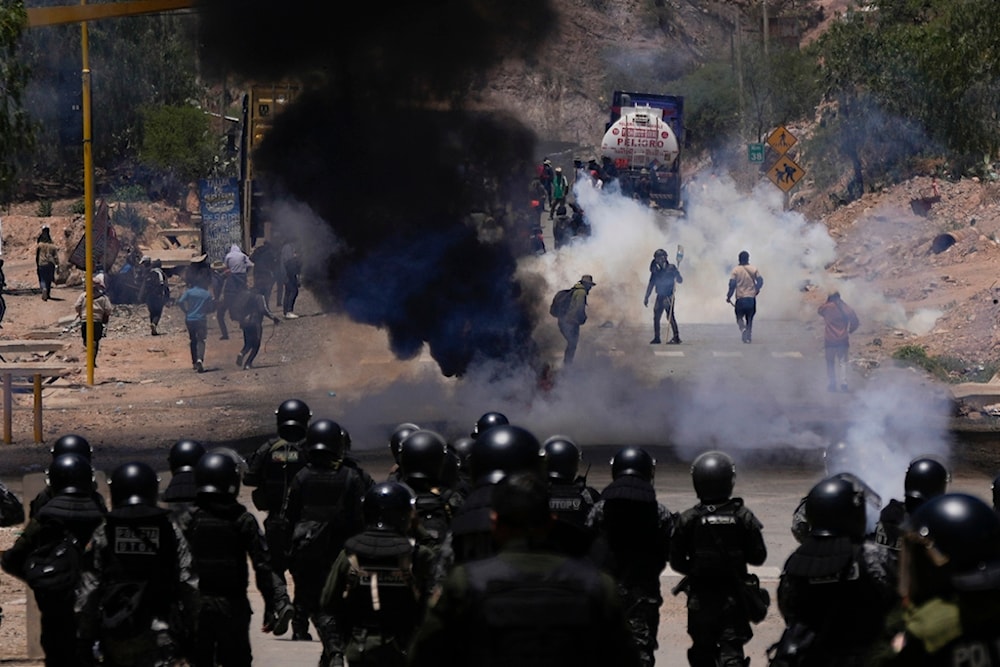Morales supporters take 20 soldiers hostage amid Bolivia unrest
Supporters of Bolivia's former president Evo Morales continue protesting the government and its policies, as Morales pursues the 2025 election despite being banned from running.
-

Police launch tear gas to disperse supporters of former President Evo Morales who have been blocking roads for days to prevent him from facing a criminal investigation, Bolivia, Friday, November 1, 2024. (AP)
Former Bolivian President Evo Morales' supporters stormed the central Chapare region's barracks and took 20 soldiers hostage, marking a significant escalation in the conflict with the government.
This comes nearly three weeks after the former president's supporters began blocking roads to hinder his arrest on what he insists are false rape charges made to impede his return to politics.
Morales' tenure in office spanned from 2006 until 2019, when he was forced to resign due to military pressure and allegations of fraudulent elections.
Bolivia's armed forces stated that "irregular armed groups" had "kidnapped military personnel" and confiscated weapons and munitions in the Chapre. While an anonymous military source told AFP that around 20 soldiers were taken hostage, video footage of the engagement shows about 16 troops surrounded by protesters holding sharp sticks.
One soldier could be heard saying "The Cacique Maraza Regiment has been taken over by Tipnis activists. They have cut off our water, electricity and are keeping us hostage," in the video, referring to the Tipnis indigenous area, which majorly supports Morales.
Acre uses all cards against Morales, supporters
Morales, despite being barred from running again, is seeking to challenge his former ally, President Luis Arce, for the nomination of the leftist MAS party in the upcoming August 2025 presidential election. This follows a large march led by the former president, where thousands of mainly Indigenous supporters protested Arce's policies.
Shortly after, prosecutors announced an investigation into Morales for rape, human trafficking, and human smuggling related to an alleged relationship with a 15-year-old girl in 2015, claims he vehemently denies, calling them “a lie”.
In response to ongoing protests and roadblocks, Arce demanded an immediate end to the disruptions, threatening to use the government's constitutional powers "to protect the interests of the Bolivian people". Many interpreted this as a potential military intervention to clear the blockades, which have led to severe food and fuel shortages and rising prices.
Morales' supporters initially sought an end to what they coined his "judicial persecution," but the protests expanded into a broader anti-government uprising that includes demands for Arce's resignation.
Morales' backers, who confirmed their commitment to remain at their barricades, hold Arce responsible for the drastic rise in food and fuel prices and shortages.
At least 61 police officers and nine civilians sustained injuries in recent clashes.
Failed Coup
Political unrest has manifested its way into Bolivia since President Acre was elected, prompting political fallout between him and former President and ally Evo Morales. Shortly after, a coup attempt aimed at dethroning Acre was exposed, and consequently failed. Morales also denounced the attempt.
On June 26, Arce denounced the "irregular mobilization" of certain army units in La Paz, while Morales accused a senior general of conspiring to stage a coup.
Videos shared on social media showed heavily armed soldiers and armored vehicles gathering in La Paz's central Plaza Murillo.
"The three chiefs of the armed forces have come to express our dismay. There will be a new cabinet of ministers, surely things will change, but our country cannot continue like this any longer," General Juan Jose Zuniga told a local TV station.
On June 27, the Bolivian Prosecutor's Office announced the initiation of criminal investigations against Zuniga and other individuals involved in the coup attempt. Zuniga and 17 others were arrested shortly after.

 4 Min Read
4 Min Read








